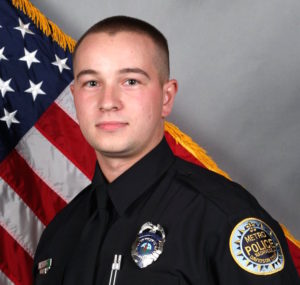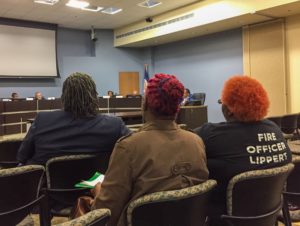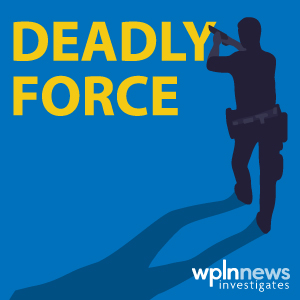
Nine months before Nashville Officer Andrew Delke shot and killed Daniel Hambrick, he was criticized by his supervisors. But not for use of force. It was a night when Delke didn’t pull his gun.
Records uncovered by WPLN News provide a rare glimpse into the mind of police officer struggling to make sense of when to use his gun, and the mixed messages he received from his training, his supervisors and an increasingly wary public.
Delke will soon go on trial for the fatal shooting of Hambrick in 2018. He will be the first Nashville police officer to face a murder charge for killing someone in the line of duty. The case will test whether an officer can be held criminally responsible for shooting an armed suspect while fleeing.
But the story of why Delke pulled the trigger that summer night could begin nine months earlier, on Nov. 4, 2017. Officer Delke had been on the force for just about a year and was patrolling on the north side of the city when a call came in.
 Courtesy Metro Nashville Police Department
Courtesy Metro Nashville Police Department Officer Andrew Delke was hired by the Metro Nashville Police Department in July 2016. He graduated from the training academy that December.
The owner of Caribbean Splash Reggae Cafe on Clarksville Pike said a former employee was standing outside with a gun.
“The guy that worked in my place — he’s on my property now with a big .45 gun in his pocket,” the man told a police dispatcher. “I need somebody to get this guy immediately.”
The dispatcher assured him that officers were on the way and asked for more details. The caller said the man was wearing black pants and a black hoodie. He also had an Afro and a beard.
Several officers in the area were rushing to the scene — including Delke. Meanwhile, the caller was getting worried.
“Please, I hope someone catches him, please,” he said.
Moments later, Delke spotted a man on a street corner with both hands in the pocket of his sweatshirt. He matched the suspect’s description.
Delke asked the man to show his hands — twice. But instead, he started running away. Delke radioed in.
“11 — running,” Delke said, short of breath. “Male black. Black hoodie. Beard.”
Delke caught up to the suspect. He drew his Taser, not his gun, and managed to arrest him.
The man’s name was Terry Crowell. It turned out, he had three outstanding warrants. And a gun.
Still, Crowell went to jail. Delke finished his shift. No one got hurt.
Mixed Messages From Supervisors
A few days after Delke arrested Crowell, Sgt. Matthew Boguskie pulled him aside to talk through the incident. Rather than a formal reprimand, Boguskie held what the department calls an “informal counseling session.” Police records show the sergeant told the rookie officer that he should have drawn his gun that night. It would have been “justified.”
But according to a summary of that meeting, Delke said he had a reason for why he didn’t: because of what he called “the hostile climate towards police use of force throughout the country.”
That hostility had been growing nationwide as one high-profile shooting after the next made headlines. Michael Brown in Ferguson, Mo. Philando Castile in Falcon Heights, Minn. Laquan McDonald in Chicago.
And there was one case in particular that Delke was thinking about. In that memo summarizing the meeting, Delke’s sergeant wrote: “Officer Delke also admitted thoughts of the Officer Josh Lippert incident were going through his head.”
 Samantha Max WPLN
Samantha Max WPLNJocques Clemmons’ mother, Sheila Clemmons Lee, wears a shirt that reads “Fire Officer Lippert” at a Community Oversight board meeting in September 2019.
Joshua Lippert is a police officer who made headlines here in Nashville nine months before Delke arrested Crowell. Lippert, a white officer, shot and killed Jocques Clemmons, a black man, after he ran from a traffic stop. And when the district attorney decided not to prosecute, people took to the streets.
There were marches, vigils, a protest outside the Metro Courthouse. Clemmons’ mother sat outside Lippert’s police precinct for months, urging the department to fire him.
On that night in November 2017, all of this was running through Delke’s mind. And that’s why he said he drew his Taser — not his firearm.
But the officer’s supervisors thought he’d made the wrong decision.
“I discussed with Officer Delke that we cannot allow outside factors to detract us from our training and what we know we should do in dangerous situations, particularly situations that could quickly rise to a deadly force situation,” Sgt. Boguskie wrote.
The Metro Nashville Police Department tells WPLN News that Sgt. Boguskie’s advice didn’t veer from department policy.
Higher-ups agreed with Delke’s supervisor. In a memo sent later that month, North Precinct Commander Terrence Graves wrote: “I am glad everything worked out without anyone being injured. I am also thankful and proud of Officer Delke’s honest response when asked about the situation.”
But the commander also thought Delke should have had his firearm “at the ready.”
“Based on this case,” he wrote, “we may need to add an element of training that addresses not letting the possibility of media attention override our training and policy.”
Metro Police says the training Commander Graves suggested was never implemented.
Delke didn’t want to be the next name in the headlines. But barely nine months later, he was.
On that sweaty summer evening in 2018, as Delke chased Hambrick through a parking lot, around a corner and past a row of townhomes, he didn’t draw his Taser. Delke pulled out his gun, aimed and fired.
Samantha Max is a Report for America corps member.
Clarification: This story has been updated to make clear that Officer Delke did not receive a formal reprimand.


